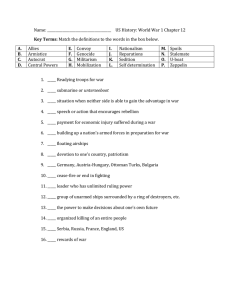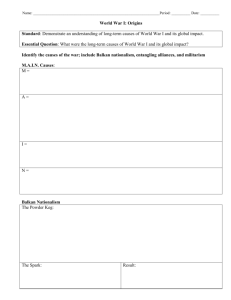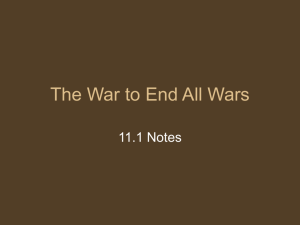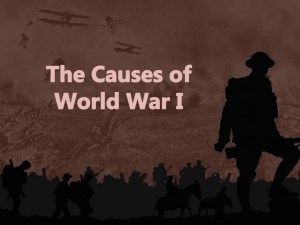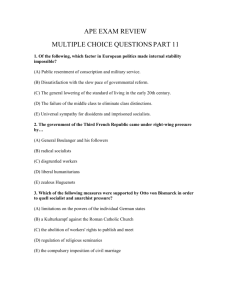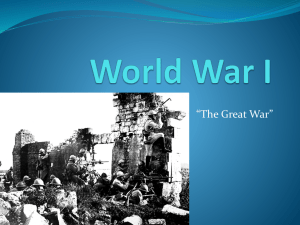File - Miss Porter History
advertisement
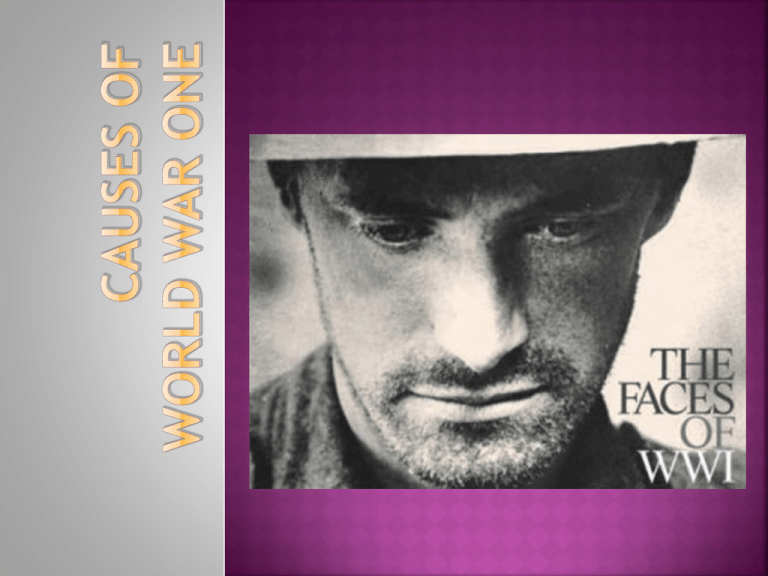
Imperialism Nationalism Militarism Alliances Assassination The practice of extending the power, control or rule by one country over areas outside its borders. The areas so controlled or ruled may be called that country's empire. Many of the economic causes of the war can be attributed to a growing material dependency of advancing European nations on imperialism. Nations such as Great Britain and France maintained domestic economies and accumulated great wealth in the late 19th century through trade, and their control of foreign resources, markets, territories, and people. As a late arrival on the world stage, Germany was locked out of the most valuable colonial regions in Africa and the Far East. In addition, the rapid exhaustion of natural resources in many European nations began to slowly upset the trade balance and make nations more eager to seek new territories rich in natural resources. Rivalries among the great powers were intensified starting in the 1880s by the scramble for colonies which brought much of Africa and Asia under European rule. A Moroccan Crisis 1905 Germany announced its support of independence for Morocco, the African colony which Britain had given France in 1904. The British defended the French, and war was avoided by a international conference in Algeciras in 1906 which allowed France to make Morocco a French protectorate. Another Moroccan Crisis 1911 Germany sent a warship to Agadir in protest of French supremacy in Morocco, claiming the French had violated the agreement at Algeciras. Britain again rose to France's defense and gave the Germans stern warnings. Germany agreed to allow France a free hand in Morocco in exchange for part of the French Congo. The causes of the war included such forces as nationalism, or patriotism. Nationalism led European nations to compete for the largest army and navy, or the greatest industrial development. It also gave groups of subject peoples the idea of forming independent nations of their own. The unification of Germany and Italy created two strong states in Europe where there had been previously only been a small collection of states. France was still angry over the loss of AlsaceLorraine to Germany following its defeat to Prussia in the FrancoPrussian War. Nationalism posed a problem for AustriaHungary and the Balkans, areas comprised of many conflicting national groups. The ardent Panslavism of Serbia and Russia's willingness to support its Slavic brother conflicted with Austria-Hungary's PanGermanism. Bosnian Crisis of 1908 Austria-Hungarian annexation of the former Turkish province of Bosnia in 1908. The Greater Serbian movement had as an object the acquisition of Slavic Bosnia, so Serbia threatened war on Austria-Hungary. Russia had pledged their support to Serbia, so they began to mobilize, which caused Germany, allied with Austria-Hungary, to threaten war on Russia. The beginning of World War I was postponed when Russia backed down, but relations between Austria- Hungary and Serbia were greatly strained. Two Balkan Wars First Balkan War (1912) Second Balkan War (1913) The wars were an important precursor to WWI, to the extent that Austria-Hungary took alarm at the great increase in Serbia's territory and regional status. This concern was shared by Germany, which saw Serbia as a satellite of Russia. Serbia's rise in power thus contributed to the two Central Powers’ willingness to risk war. The belief or desire of a government or people that a country should maintain a strong military capability and be prepared to use it aggressively to defend or promote national interests. The menace of the hostile division led to an arms race, another cause of World War I. Acknowledging that Germany was the leader in military organization and efficiency, the great powers of Europe copied the universal conscription, large reserves and detailed planning of the Prussian system. Armies and navies were greatly expanded. The standing armies of France and Germany doubled in size between 1870 and 1914. Naval expansion was also extremely competitive, particularly between Germany and Great Britain. Naval Arms Race British had established the principle that in order to maintain naval superiority in the event of war they would have to have a navy two and a half times as large as the second-largest navy. This motivated the British to launch the Dreadnought, invented by Admiral Sir John Fisher, in 1906. As Britain increased their output of battleships, Germany correspondingly stepped up their naval production. International rivalry caused the arms race to continue to feed on itself. A very tight web of alliances around the European nations (many of them requiring participants to agree to collective defense if attacked). Treaty of London, 1839, about the neutrality of Belgium. German-Austrian treaty (1879) or Dual Alliance, Italy joining Germany and Austria in 1882, Franco-Russian Alliance (1894). "Entente" (less formal) between Britain and France (1904) and Britain and Russia (1907) forming the Triple Entente. Russia proclaiming itself the “Protector of the Southern Slavs" in the Balkans through several treaties. Europe had reached its breaking point when on June 28, 1914, Archduke Francis Ferdinand, heir to the Austria-Hungarian throne, was assassinated in Sarajevo, Bosnia, by a Serbian nationalist belonging to an organization known as the Black Hand. The assassin was Gavrilo Princip. Immediately following the assassination Germany pledged its full support (blank check) to Austria-Hungary, pressuring them to declare war on Serbia, while France strengthened its backing of Russia. Convinced that the Serbian government had conspired against them, Austria-Hungary issued Serbia an unacceptable ultimatum. Austria-Hungary declared war on Serbia on July 28, 1914. On July 29, Russia ordered a mobilization against Austria-Hungary in support of Serbia. The Germans threatened war on July 31 if the Russians did not demobilize. Upon being asked by Germany what it would do in the event of a Russo-German War, France responded that it would act in its own interests and mobilized. On August 1, Germany declared war on Russia, and two days later, on France. The German invasion of Belgium to attack France, which violated Belgium's official neutrality, prompted Britain to declare war on Germany. World War I had begun.
